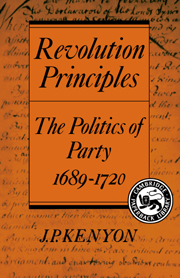Book contents
- Frontmatter
- Contents
- Preface
- Preface to the paperback edition (1990)
- 1 Introduction
- 2 By force or by miracle
- 3 The measure of submission
- 4 This skein of tangled principles
- 5 King Charles's head
- 6 The bloody flag
- 7 Revolution Principles
- 8 Black and odious colours
- 9 The four last years
- 10 That triumphant appellation
- 11 Conclusion
- Appendix
- Abbreviations
- Notes
- Addendum
- Index
5 - King Charles's head
The cult of divine right monarchy
Published online by Cambridge University Press: 07 October 2009
- Frontmatter
- Contents
- Preface
- Preface to the paperback edition (1990)
- 1 Introduction
- 2 By force or by miracle
- 3 The measure of submission
- 4 This skein of tangled principles
- 5 King Charles's head
- 6 The bloody flag
- 7 Revolution Principles
- 8 Black and odious colours
- 9 The four last years
- 10 That triumphant appellation
- 11 Conclusion
- Appendix
- Abbreviations
- Notes
- Addendum
- Index
Summary
The strength of the Tory revival in the late 1690s need not surprise us, for in England conservatism was still the natural political philosophy.
It is true that in the history of the West two main strands of political dogma have always been intertwined: government by authority, and government by consent. In fact, this extended back into Judaic history, and the Old Testament provides examples of both; for if David and Solomon were clearly absolute monarchs, the rule of Moses or the Judges was obviously by consultation or consensus. Despite the authoritarianism of the Tudors, the very existence of parliament demonstrated the survival of the idea of consent through English history, and there were, of course, in the Middle Ages many episodes which showed the ability and the willingness of the English to carry the idea to its logical conclusion, by deposing rulers who did not consult them, or were otherwise noxious. Edward II and Richard III were names much bandied about in 1689 and the succeeding years, and it was an inescapable fact that the establishment of the Tudor dynasty, and through it the Stuart, depended on the deposition of Richard III.
But it must be appreciated that such ideas were unnatural in a seventeenth-century context; they ran directly counter to the inbuilt assumptions of an age of deference – deference of wives to husbands, children to parents, servants to masters, tenants to gentry, gentry to nobility. These assumptions were firmly supported by the church, in its homilies and even in its catechism.
- Type
- Chapter
- Information
- Revolution PrinciplesThe Politics of Party 1689–1720, pp. 61 - 82Publisher: Cambridge University PressPrint publication year: 1977
- 1
- Cited by

